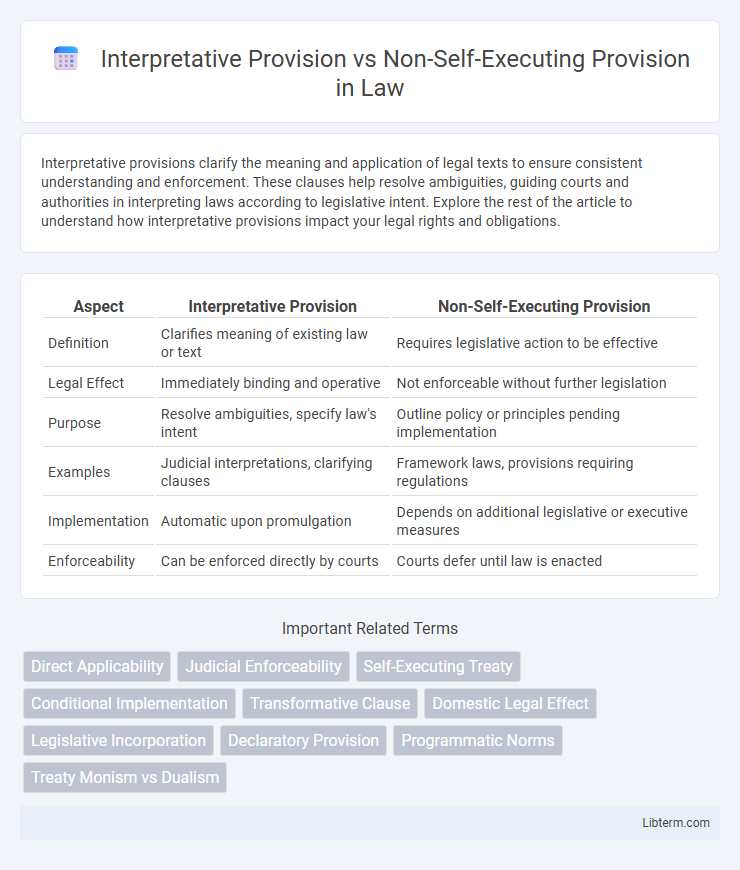Interpretative provisions clarify the meaning and application of legal texts to ensure consistent understanding and enforcement. These clauses help resolve ambiguities, guiding courts and authorities in interpreting laws according to legislative intent. Explore the rest of the article to understand how interpretative provisions impact your legal rights and obligations.
Table of Comparison
| Aspect | Interpretative Provision | Non-Self-Executing Provision |
|---|---|---|
| Definition | Clarifies meaning of existing law or text | Requires legislative action to be effective |
| Legal Effect | Immediately binding and operative | Not enforceable without further legislation |
| Purpose | Resolve ambiguities, specify law's intent | Outline policy or principles pending implementation |
| Examples | Judicial interpretations, clarifying clauses | Framework laws, provisions requiring regulations |
| Implementation | Automatic upon promulgation | Depends on additional legislative or executive measures |
| Enforceability | Can be enforced directly by courts | Courts defer until law is enacted |
Introduction to Treaty Provisions
Treaty provisions are categorized as interpretative or non-self-executing based on their applicability in domestic law without further legislative action. Interpretative provisions clarify the meaning and scope of treaty obligations, guiding consistent application and interpretation in national courts. In contrast, non-self-executing provisions require implementing legislation to have direct legal effect domestically, as they outline principles or objectives that lack immediate enforceability.
Defining Interpretative Provisions
Interpretative provisions clarify the meaning and scope of constitutional or legal texts without creating enforceable rights or obligations, serving to guide judicial and administrative interpretation. In contrast, non-self-executing provisions require enabling legislation before they can be applied or enforced by courts. Defining interpretative provisions involves recognizing their role in explaining legislative intent and resolving ambiguities without independently triggering direct legal effects.
Understanding Non-Self-Executing Provisions
Non-self-executing provisions require legislative action to become effective, meaning courts cannot enforce these provisions without enabling laws. Understanding non-self-executing provisions is crucial as they lack immediate legal effect, often necessitating further clarification or implementation through national legislation. This distinction ensures proper application and prevents premature judicial enforcement of provisions intended only as guiding principles.
Key Differences Between Interpretative and Non-Self-Executing Provisions
Interpretative provisions clarify the meaning and intent of existing laws without requiring additional legislation to be enforceable, serving as guiding tools for legal interpretation. Non-self-executing provisions, by contrast, are constitutional or legal clauses that require specific legislative action before they can be applied or enforced, often involving implementing measures or regulations. The key difference lies in interpretative provisions being immediately applicable through judicial interpretation, while non-self-executing provisions depend on legislative enactment before gaining legal effect.
Legal Doctrines and Judicial Approaches
Interpretative provisions guide courts in understanding and applying legislation, reflecting judicial deference to legislative intent without creating enforceable rights, while non-self-executing provisions require explicit legislative action before becoming legally operative, embodying the doctrine of separation of powers. Judicial approaches to interpretative provisions often emphasize purposive interpretation and the harmonious construction of statutes, whereas courts confronting non-self-executing provisions exercise restraint, recognizing the necessity for political branches to implement concrete measures. These distinctions underscore fundamental legal doctrines governing statutory interpretation and constitutional implementation across common law and civil law systems.
Impact on Domestic Law Implementation
Interpretative provisions guide courts in applying international treaties without the need for legislative action, ensuring smoother integration into domestic law. Non-self-executing provisions require explicit legislative measures before they can create enforceable rights or obligations within a country. This distinction significantly impacts the speed and manner in which international agreements influence national legal systems and policy enforcement.
Case Studies Illustrating Interpretative Provisions
Case studies illustrating interpretative provisions often highlight how courts clarify ambiguous legislative language to ensure laws align with constitutional principles, as seen in landmark rulings like Marbury v. Madison. These provisions allow judicial bodies to adapt statutes contextually without declaring them invalid, promoting legal stability while addressing practical issues. In contrast, non-self-executing provisions require additional legislative action to be enforceable, delaying implementation until explicit enabling measures are enacted.
Case Studies Involving Non-Self-Executing Provisions
Case studies involving non-self-executing provisions reveal challenges in enforcement and interpretation, such as the landmark Filipinas case where courts demanded enabling legislation to activate treaty rights. These provisions require domestic legislation to give effect to international obligations, often leading to delayed implementation and judicial scrutiny. Judicial decisions emphasize the distinction between interpretative provisions, which guide understanding without additional legislation, and non-self-executing provisions that remain dormant until expressly enacted into national law.
Implications for International Relations
Interpretative provisions guide states in applying treaty obligations without creating immediate legal duties, allowing flexibility in diplomatic negotiations and adaptation to evolving international contexts. Non-self-executing provisions require domestic legislation for enforcement, affecting how treaties influence national policies and the pace at which international commitments become operative. The distinction impacts the balance between sovereign autonomy and compliance with international law, shaping states' behavior and trust in multilateral agreements.
Conclusion and Future Perspectives
Interpretative provisions guide judicial understanding without creating enforceable rights, while non-self-executing provisions require legislative action for implementation, affecting their immediate legal impact. Future perspectives indicate a growing need for clearer differentiation in international treaties to ensure effective application and enforcement by domestic courts. Strengthening mechanisms for the timely transformation of non-self-executing provisions could enhance legal certainty and promote consistent treaty adherence globally.
Interpretative Provision Infographic

 libterm.com
libterm.com